DO-IT News May 2019

Volume 27, Issue 3
Below are the articles of the DO-IT News May 2019 newsletter. These articles can also be seen all on one page at the Full Newsletter option.
Meet the 2019 Scholars!
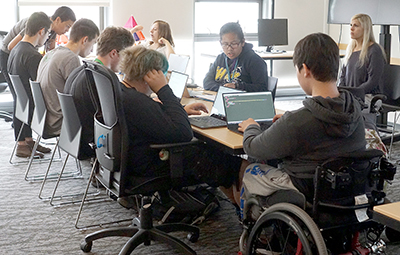
This summer DO-IT will host its twenty-seventh-annual Summer Study program for DO-IT Scholars, providing participants the opportunity to experience life on a college campus and explore challenging academic and career fields such as those in science, engineering, and computing. Primary funding for the Scholars program is provided by Washington State. For more information, visit our website.
I am pleased to introduce to you the 2019 Scholars:
Alexis enjoys her classes in math and art at Mossyrock High School. She would like to attend Digipen to pursue a bachelor's degree in digital art and animation. She also hopes to have her own cartoon series on the internet. She participates in pep band and Knowledge Bowl. She also enjoys video games, Dr. Who, and anime. Alexis has autism.
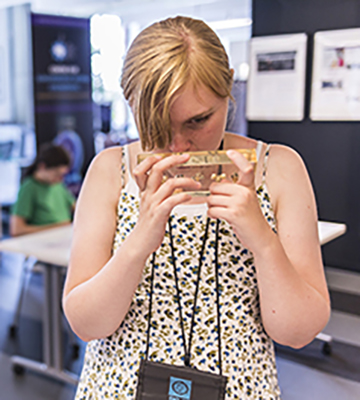
Alison attends Tahoma High school where she especially enjoys her classes in English and history. She is considering a career as a librarian because she enjoys reading, helping others, and doing research; or as an elementary school teacher because she loves watching young minds grow and helping students learn. Alison has a learning disability.
David enjoys science and history. He attends West Valley High School in Spokane. He has Attention-Deficit/Hyperactivity Disorder (ADHD) and autism. David volunteers at his local pet shelter to help animals in need. He is interested in the environment and everything else on our planet.
Ellie enjoys studying math, biology, and medicine. Her other interests include fiber and needlework (knitting and spinning), hedgehogs, service dogs, entrepreneurship, web design, cooking, and many fandoms. Ellie’s goal is to possibly earn a Ph.D. in genetic medical research or medical product design. Her passion is to make the world easier to navigate.
Grant has autism and uses augmentative and alternative communication (AAC) to communicate. He enjoys being part of a large community at Bellevue High School, but he feels most at home working alongside other disability advocates, academics, and scientists to help others in the autism community. He is particularly interested in neurology and psychology, as well as meaningful discussions on any topic. At this point, Grant plans to pursue a liberal arts degree with a scientific focus.
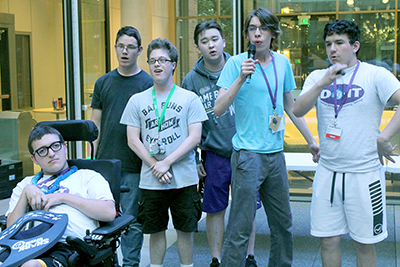
Jacob’s career goal is to focus his engineering and design passions on improving the design of transit systems and adaptive products. He attends Cleveland STEM High School in Seattle. Jacob has Duchenne muscular dystrophy and Asperger’s syndrome. He has served as the Muscular Dystrophy Association’s local Goodwill Ambassador, making public appearances, raising funds, and giving media interviews.
Kayla is most interested in English and the life sciences (such as biology, earth and space science, anatomy and physiology), and neuroscience. She has a variety of potential career interests from neuroscience to real estate to education. She has low vision and oculocutaneous albinism. Kayla attends Issaquah High School and has completed for-credit classes at Bellevue College, University of Washington, and Eastern Washington University.
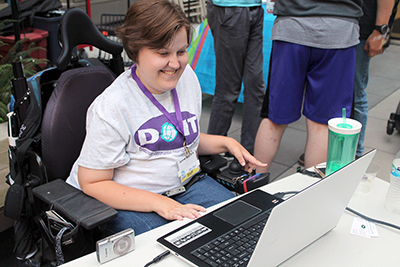
Kelvin attends Cascade High School in Leavenworth where he enjoys studying science and digital art. His goal is to study sports management to become a soccer coach. He has Duchenne muscular dystrophy. He is a huge World Cup fan and has helped as an honorary assistant coach for the soccer team for two years. Kevin has a degenerative physical disability that impacts his muscle tone.
Merritt loves music and plays both the piano and alto saxophone. He has autism. He hopes to pursue a degree in the natural sciences to educate people about flora, fauna, animals, and history in a National Park setting. Merritt uses photographic and audio recordings to capture his interest in the natural world. His favorite academic areas at Friday Harbor High School are history and environmental sciences. Merritt is an avid reader.
Norma attends the Lummi Nation School in Bellingham. She has a learning disability. She hopes to begin Running Start next year and then pursue a career in the geosciences or biological sciences.
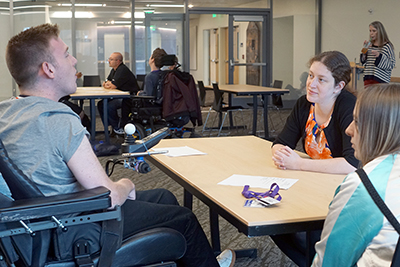
Paula attends the Lummi Nation School in Bellingham. She has a learning disability. She hopes to begin Running Start next year and then pursue a career in science or history.
Risa attends The Community School in Spokane. She enjoys arts like sewing, mixed media, sculpting, and digital art/animation, as well as sciences such as biology, chemistry, physics, and engineering. She has autism and narcolepsy.
Rohan attends Tesla STEM High School in Redmond where his two favorite subjects are science and mathematics. He hopes to start his career in the biomedical sciences, as well as having experience in computer science.
Sam enjoys his classes in the history of the Pacific Northwest and math. He participates in wheelchair basketball.
DO-IT Women Win UW Award
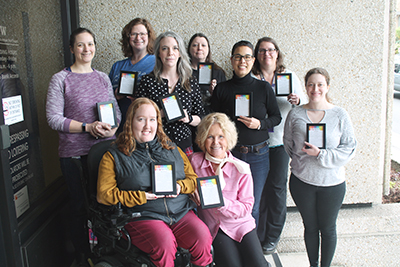
In February, the University of Washington celebrated all women on campus by hosting a UW Women’s Award, inviting staff, faculty, and students to identify women across campus who have inspired hard work, strength, and persistence. All women who were nominated were honored at the event, receiving framed prints of their award. I, as well as DO-IT’s Anna Marie, Brianna, Elizabeth, Gaby, Kayla, Laura, Lyla, Susie, and Tami, were all nominated.
The event featured snacks, socializing, and a raffle, as well as a presentation by Dr. Sarah Myhre, a climate and ocean scientist with extensive experience in advocacy and community organizing experience. Her speech featured women’s contributions, both at the UW and worldwide, and discussed the support women give each other to create a more inclusive, supportive world. After her speech, a few nomination letters were read out loud as examples of the abundance of great female leaders in our community.
Congratulations to all the fantastic women who work at DO-IT and help to make our programs and operations run smoothly!
ERC-INCLUDES Capacity Building Institute: Creating a Culture of Inclusion in NSF-funded Projects
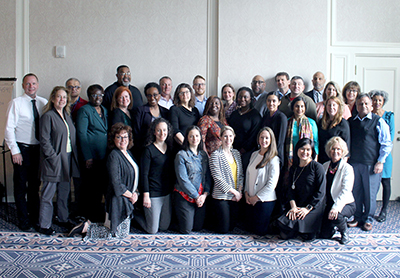
On April 3 – 5, DO-IT and the University of Washington Center for Neurotechnology (CNT) hosted the ERC-INCLUDES capacity building institute (CBI) in Seattle, WA. The goal of the project is for two major National Science Foundation (NSF) programs to share best practices for including underrepresented and underserved groups in science, technology, engineering, and mathematics (STEM).
Participants were from one of two large NSF programs, Engineering Research Centers (ERCs) or Inclusion across the Nation of Communities of Learners of Underrepresented Discoverers in Engineering and Science (INCLUDES), an initiative designed to “enhance US leadership in STEM discoveries and innovations by focusing on broadening participation in these fields.”
Thirty-five participants from all over the US shared best practices for broadening participation though presentations, small group discussions, and brainstorming sessions that addressed a range of topics that include the following:
- Expanding Diversity through the Creation of Learning Opportunities for Minority Students
- An Integrated Approach to Retain Underrepresented Minority Students in STEM Disciplines
- Interdisciplinary Research between Social Science and Engineering
- Applying Systems Thinking to Broadening Participation
- Letting Students Lead the Way to Inclusive Excellence
- Early STEM Engagement for Minority Males
In addition to presentations about engaging women, racial and ethnic minorities, first generation college students, and families with low income, the CBI discussed disability as an important part of diversity. Disability-related presentations by DO-IT staff included Promoting Universal Design to Create a Culture of Inclusion (Sheryl Burgstahler), Why Accessible Information Technology is Critical for an Inclusive Project (Gaby de Jongh), and Engaging Individuals with Disabilities at an Engineering Research Center (Scott Bellman).
In addition to the CBI, the ERC-INCLUDES project will create an online community of practice for stakeholders, a website with conference proceedings and resources, and other products. The ultimate goal is for project participants to create new collaborations and learn from one another as they pursue the ultimate goal of diversity in STEM education and careers. Consult our website for details.
Strategic CSforALL Resource & Implementation Planning Tool
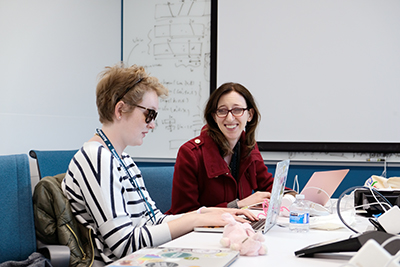
A big thank you to the AccessComputing group for enabling me to attend the CSforALL SCRIPT (Strategic CSforALL Resource & Implementation Planning Tool) Symposium at the Scripps Institute of Oceanography in San Diego, California from January 14 – 17. I learned about what schools and states are doing to improve K-12 computer science education.
The workshop was aimed at school districts, state departments of education, and partner organizations to help get computer science education into every K-12 school. I represented myself as a partner organization because of my work starting an after-school computer club at the South Carolina School for the Blind. I hope that with the tools I learned at the symposium to expand our offerings, either during the school day or as part of after school activities.
During the symposium, I lead a breakout session about including students with disabilities in computer science education. It was successful and led to some interesting questions and conversations from participants. One district represented in my group had never previously thought about including students with disabilities as a target demographic for inclusion. I would suggest that all the districts and states be required to participate in a diversity inclusion session.
I also got to meet and collaborate with 150 education leaders from 14 states. I hope that my message to encourage participation of students with disabilities in computer science will impact someone down the road. If it does, then I have served my purpose to make getting an accessible education easier.
Check out some further reading about CSforALL and the SCRIPT Symposium.
Remembering Disability Leader Toby Olson
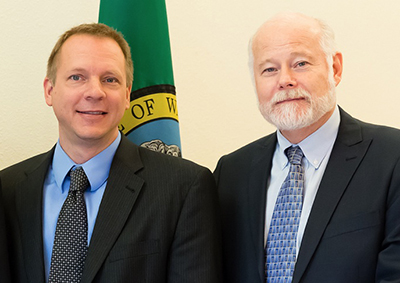
DO-IT was sad to learn about the sudden passing of Toby Olson, the Executive Secretary of the Washington State Governor’s Committee on Disability Issues and Employment.
A press release from the State of Washington shared, “In his 31 years of state service, Olson wrote, co-authored, and secured passage and enactment of more than 40 state laws expanding the rights and opportunities for people with disabilities in such areas as employment, civil rights, education, housing, transportation and healthcare.”
Toby worked tirelessly to encourage public dialogue about disability issues and challenge faulty assumptions about the talent and value of people with disabilities. Toby’s work also impacted many in the DO-IT community. For example, he oversaw the Governor Committee’s Youth Leadership Forum (YLF), in which many DO-IT participants have engaged as delegates, interns, presenters, and members of the planning committee over the last 18 years. YLF students serve as delegates from their communities at a six-day camp each summer. They build leadership and self-advocacy skills as they learn about community involvement, governance, and career preparation. Tami Tidwell (DO-IT Program Coordinator/Counselor), K Wheeler (‘13 Scholar), and Brandon Muller (’01 Scholar) served on the YLF leadership team. Julie Peddy (DO-IT Advisory Board Member), has served as chair of the YLF subcommittee.
Additional DO-IT staff and students have volunteered and served in programs under Toby’s leadership. Conrad Reynoldsen (‘03 Scholar), and Scott Bellman (DO-IT Program Manager) have served as chairs of the Governor’s Awards Subcommittee- a group that recognizes employers for the successful hiring, retention, and promoting of individuals with Disabilities. Daman Wandke (‘05 Scholar) served as an appointed member of the Governor’s Committee and served on multiple subcommittees.
Toby will be truly missed, but his legacy will live on in those he inspired to make the world more welcoming and accessible to individuals with disabilities.
AccessComputing PI, Co-PI, and Collaborator Win Awards
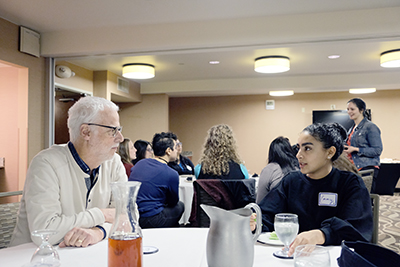
This spring, AccessComputing PI Richard Ladner and co-PI Jacob Wobbrock both received awards. Ladner was named the recipient of the 2019 National Center for Women & Information Technology (NCWIT) Harrold and Notkin Award. This award recognizes faculty members who distinguish themselves with outstanding research and excellent graduate mentoring, as well as those who recruit and encourage women and minorities in computing fields.
Ladner mentioned how special it is to receive an award named after his long-time colleague David Notkin, who was a faculty member here at UW. Richard receives the award at the 2019 NCWIT Summit on Women and IT. More information is on the NCWIT website.
Meanwhile, Jacob Wobbrock was inducted into the CHI Academy, which is recognized as the highest honor in the field of human-computer interaction. Each year, the Special Interest Group on Computer-Human Interaction (SIGCHI) recognizes six to eight scholars for their contributions to scholarship and innovation in the field.
Jake said, “I am extremely honored to be inducted into the CHI Academy, and to join such a prestigious group of CHI pioneers whose contributions I have admired for decades. To receive the SIGCHI Social Impact Award two years ago and now to be inducted into the CHI Academy have been the highlights of my professional life, and I feel deeply indebted to the UW Information School, to the design: use: build: (DUB) Group, and to my current and former Ph.D. students and collaborators who have provided the environment and teamwork to make this possible for me."
Jen Mankoff, a collaborator of AccessComputing and faculty member in the UW Paul G. Allen School of Computing Science and Engineering, was also inducted into the CHI Academy this year. More information can be found at the SIGCHI Awards website.
Service Dogs and Independence
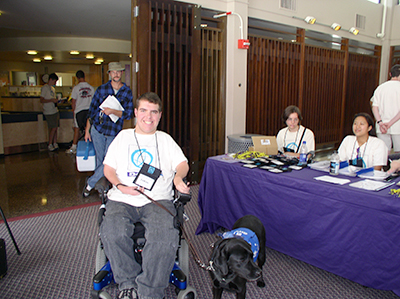
There are a lot of different reasons people might choose to have a guide or service dog. Emily Stevenson, 2011 Scholar, wanted a guide dog to gain more independence. “I hated being reliant on other people when I needed to get somewhere unfamiliar. Having a guide dog has boosted my confidence, because I know I can put some of the decisions, such as when to turn, in her very capable paws. Even when I make a mistake, I have someone there to help me turn back in the right direction.”
Emily’s biggest piece of advice for someone who wants to get a service animal is to remember that when you take on the responsibility of an animal, you are taking care of another living creature, not just another piece of equipment. “I personally learned this the hard way. I got my guide dog, Henna, in the middle of college. So, on top of trying to get my engineering degree, I had to care for another living creature who can also get sick or need food at a particular time. Keeping all of that in mind, please make sure you are truly prepared for all that entails.”
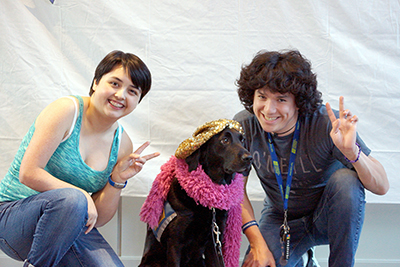
Naomi Smith, 2016 Scholar, wanted a service dog to both be a best friend and offer assistance. She says, “I have right-handed hemiparesis and epilepsy. This basically means my right side is weaker than my left and I have an assortment of learning disabilities. My service dog, Libby helps out with basic needs around the house like laundry, lights, and doors. Though she was not trained to, she helps me balance and tries to warn me if I am about to have a seizure.
Having Libby had an impact on Naomi’s life in many ways. “I became confident and assertive in my everyday life, which translated into advocating for myself instead of relying on my parent’s voices. When people don’t believe I have a real service dog, or that I need one, I have to stand up for Libby and myself to explain she needs to be with me. This forced me out of my shell. However, service dogs also come with a lot of responsibility. I would advise anyone that is thinking of getting a service dog to be prepared. You are now responsible for your dog and yourself. You are now a team.”
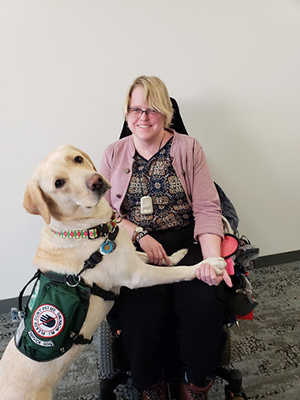
Chanon Gallow, 1999 Scholar, wanted a service dog to help her get outside and also have confidence and feel assertive. However, she quickly realized that applying for and receiving a service dog is a lengthy process. The whole process may be completed within a year, but can often take much longer. For Chanon, it took over ten years. She requested a dog in 1999, but was only approved by Paws with a Cause in 2009, and she still needed $20,000 in sponsorship. In 2011, she was finally connected with two local benefactors, including her mayor and the former high school history teacher, to provide the funds to get Jersey, her service dog.
Brianna Vail, 2008 Scholar, wanted a service dog to give her the independence and the ability to move out on her own. Her service dog, Mabel, is able to do most of the things that she would need to ask another person to do. Her parents also enjoy the peace of mind that Mabel can get the phone in an emergency. “I feel that I have learned to be more relaxed and to go with the flow. I also get excited when Mabel and I can do demos for the community.”
Whatever the reason you might be thinking of for getting a service dog, it is important to consider how well you are prepared for both the application process and caring for an animal. In the end though, the work put in is more worth it for the independence granted.
OurCS@UW+AccessComputing Workshop
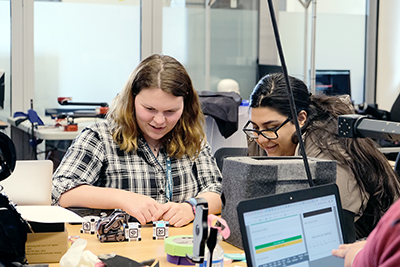
OurCS@UW+AccessComputing, a two-day research-focused workshop for undergraduate women with disabilities in computing fields was held April 11 – 13 in the new Gates Center at the UW. Students from universities nationwide were immersed in an interactive workshop with mentors from UW, other universities, and Google.
Students with disabilities participated in research explorations with faculty, graduate students, and professional mentors. The explorations focused on accessibility-related topics including app accessibility, accessibility of design methods, fabrication for accessibility, social robots for mental health, accessible virtual reality, and teachable machines for sign language. Working in small groups with mentors, students explored these areas and presented on their findings.
OurCS@UW+AccessComputing workshop also featured keynotes from mentors with disabilities. Jen Mankoff, the Richard E. Ladner Professor in UW’s Paul G. Allen School of Computer Science & Engineering, gave a keynote that looked at ways that her research interests evolved over time as her disability changed. Shiri Azenkot, assistant professor of information science at the Jacobs Technion-Cornell Institute at Cornell Tech, Cornell University, gave a keynote that focused on navigation for individuals with low vision.
Funding was provided by Google Explore CSR, the Paul G. Allen School of Computer Science & Engineering, and AccessComputing.
Choosing a College
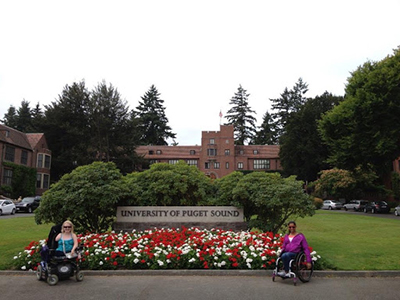
There are many reasons to choose a specific college; they include accessibility. In this article, Scholars share their experiences on when, where, and why they choose specific schools; give advice on the college selection process; and offer tips they would follow if given another opportunity.
Throughout different parts of the college application process, consider the following questions:
- When do you start your search?
- How many schools do you consider?
- How do you research them before going in person? Do you consider visiting prospective schools at all? If so, what do you check for while there?
- Do you visit the disability services office? How do you connect with them?
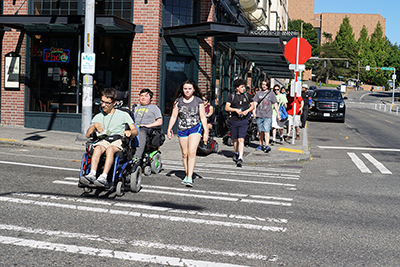
K Wheeler, a 2013 Scholar, reported looking at colleges the summer before their senior year of high school. “I took a college-touring trip with my mom and fellow Scholar Anita. We took a few days and checked out pretty much every university between Seattle and the greater Portland area, except for the University of Washington (UW), as I already had a basic idea of the campus from Summer Study,” K explained. “I knew I wanted to stay near home, but far enough away that I wasn’t living at home. Wherever I ended up, I wanted to be able to easily come home to Lynnwood for a long weekend. And I needed an accessible campus; I’m a power chair user and need to be able to get around.”
Many students also focused on the types of degree programs different colleges had to offer. Alicia Teasley, 2012 Scholar, said “when applying to college, I started very late. To be honest, I wasn’t at all motivated to start looking at colleges, I wanted to take a gap year and travel. After encouragement by my parents and teachers, I started the process and applied to five colleges in eight hours, with the intention of going to medical school. I picked colleges based on how good their pre-med and STEM programs were.”
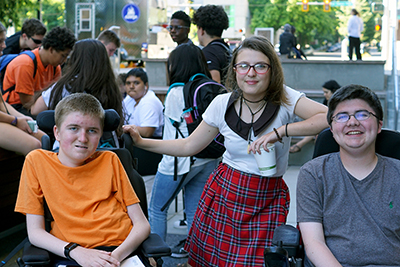
Students also consider how far they want to move from home. Alicia, like K, also didn’t want to travel too far from home. “I also picked colleges based on where they were; I did not want to live on the East Coast, so I mainly picked schools in the west.” However, staying close to home is not on every Scholars’ agenda. Jonah Perez, a 2015 Scholar, said “I applied to three colleges, one of them the University of Illinois. I relied on reputation when deciding to put it on my college list. I had heard from my therapist about how great their disability resource center was and how accessible their campus was.”
Students who have gone through the selection process can share lessons learned with others. “I wouldn’t say I did a good job of researching the colleges I applied too. I had resources such as DO-IT to help me, but I didn’t utilize it like I should have.” Jonah said. It can be hard to tour colleges that are far from home. “I didn’t visit any of the colleges I applied to because none of them were very close to Olympia. That also means I didn’t visit the disability resource center on any campuses. Looking back on it, I would recommend calling the offices and asking them questions such as how the campus deals with the different seasons, the terrain of the university, and the transportation students use. I got lucky that the University of Illinois is pretty fantastic, with an amazing disability resource center, a pretty flat campus, and a culture of inclusion. I’ve found that experience is the biggest key; until you go ahead and experience how they are, you won’t really know.”Alicia said she mostly researched the colleges she applied to online and at college fairs. “I only visited the University of Washington because it was close to my home. In my junior and senior years I didn’t have time to travel that far.”
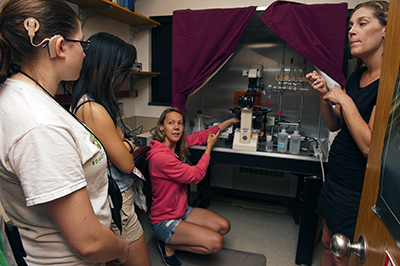
Scholars also considered extracurricular activities during their college search. “At the time, I was still swimming for Team USA, so I needed access to a pool, and, depending on how far it was from home, a new set of coaches. After my touring trips, I decided I was going to apply to the University of Puget Sound (UPS) and UW, which both had good pools and easy access to coaching” said K. “UPS also had a nice, beautiful, and small campus that really made me feel at home. As a smaller liberal arts institution, they had a great student to teacher ratio, which was a huge plus. I was pretty set on going to UPS until I visited again and realized that even though the campus was accessible, none of the surrounding town was. I’d never be able to leave campus.”
Accessibility is a big part of having a good college experience, and making sure you can access the physical spaces in order to feel at home in the community is crucial. Getting the right accommodations is also important, in order to ensure you can succeed as much as possible academically.
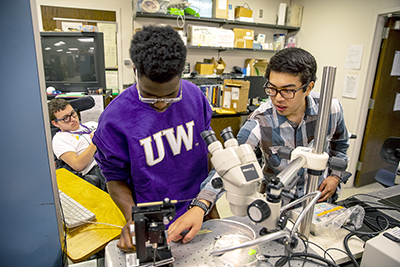
Alicia said, “when I got into UW, I visited Disability Resources for Students (DRS) and met with the counselor that would be handling my case. I felt good about our meeting. He assured me that I would get all my accommodations both in the classroom and in my dorm. My older sister, who is also Deaf, was attending UW at the time, so she helped me understand how DRS worked and what accommodations would be provided. The only thing that was not helpful was that it was really hard to get an appointment at DRS. They were always busy and prioritized current students over prospective students.”School size makes a difference to. Sometimes, smaller colleges or programs can offer a closer community and can make accommodation offices easier to navigate. “It wasn’t necessarily a deal breaker for me, but I wanted smaller class sizes.” K said. “I had heard from friends that went to large universities about their 300 or more people classes and, quite frankly, it intimidated me. I wanted to feel at home on campus.”
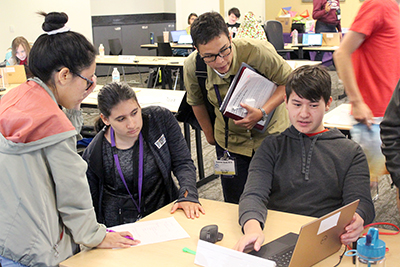
However, larger schools may offer more accessibility and accommodation options. It can also be possible to attend smaller programs within a larger university. “While finishing up my application for UW, one of my coaches convinced me to apply for the interdisciplinary honors program, which would offer me smaller classes and a community throughout all four years. It gave me the feeling of being in a small liberal arts school, while still having the resources of a top-rated state school. It really made UW a best-of-both-worlds situation. Picking a smaller, non-STEM major also helped keep classes sizes down, and the few 100+ people classes I had to take really weren’t as bad as I thought they’d be. I’m ultimately very glad that I decided to attend UW!”
Which college to attend is a big decision, and it’s hard to balance everything that could potentially impact your education. Some other questions to ask include the following:
- What do their accessible dorms look like?
- Do they have options for a private bathroom instead of shared bathrooms?
- How is the food provided in the dining halls? Is it an “all you can eat” cover charge, or a pay per item system? Do they have food that can support any dietary needs or restrictions you may have?
- Is it a public or private school? How much is tuition going to cost?
Hopefully these can guide your choices in a way that is helpful and reduces stress as you start this new chapter of your life! Other related resources can be found on DO-IT's website.
About DO-IT
DO-IT (Disabilities, Opportunities, Internetworking, and Technology) serves to increase the successful participation of individuals with disabilities in challenging academic programs and careers, such as those in science, technology, engineering, and mathematics. Primary funding for DO-IT is provided by the National Science Foundation, the State of Washington, and the U.S. Department of Education.
For further information, to be placed on the DO-IT mailing list, request this newsletter or other materials in an alternate format, or make comments or suggestions about DO-IT publications or web pages, contact us at
DO-IT
University of Washington
Box 354842
Seattle, WA 98195-4842
doit@uw.edu
www.uw.edu/doit/
206-685-DOIT (3648) (voice/TTY)
888-972-DOIT (3648) (toll free voice/TTY)
509-328-9331 (voice/TTY) Spokane
206-221-4171 (fax)
Founder and Director: Sheryl Burgstahler, Ph.D
Program Manager: Scott Bellman